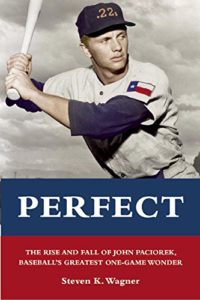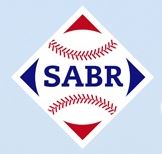 Perfect: The Rise and Fall of John Paciorek, Baseball’s Greatest One Game Wonder
Perfect: The Rise and Fall of John Paciorek, Baseball’s Greatest One Game Wonder
by Steven K. Wagner
Breakaway Books, 2015
$12.95
Can you imagine a baseball book that examines an entire big league career – pitch by pitch? Well, you don’t have to. Steven K. Wagner has done just that in his book Perfect: The Rise and Fall of John Paciorek, Baseball’s Greatest One-Game Wonder.
Wagner’s book focuses on the one-game MLB career of John Paciorek (September 29, 1963 – the last day of the 1963 season). In that contest, the 18-year-old Houston Colt .45’s outfielder was truly perfect: five trips to the plate – five times on base (three hits and two walks); four runs scored, three runs driven in; four errorless plays in the outfield.
A perfect start to what Paciorek – and many others – expected to be a long and successful major league career. Yet, as Wagner tells it, after his fifth trip to the plate in that day’s 13-4 Houston win over the Mets: “Paciorek knew he would not bat again that day, or that season. He had no way of knowing, however, that he would never again swing at a major league pitch. He would never catch another ball, or have the opportunity to prevent a runner from scoring with a dazzling throw. Other than a few practice tosses he would receive from center fielder (Ivan) Murrell as the players warmed up for the last half inning of play, he would not touch a baseball again in the major leagues.”
He had so much talent. It’s hard to believe he didn’t succeed in baseball. No one was a better athlete than he was. He showed power … he was certainly a star in the making.
Rusty Staub teammate of John Paciorek,
22-year MLB career, six-time All Star
Paciorek also had no way of knowing that, more than 50 years later, he would still be recognized as having the greatest one-game career in MLB history (the only player with more than one MLB at bat and a 1.000 batting average).
John Paciorek’s is the finest example of a perfect one-game career, neatly packaged, the quotient of his own perfect afternoon of hitting, fielding and base running that baseball has ever seen. Indeed, John’s perfect day is one for the ages … and a baseball story worth telling.
Albie Pearson, Major League outfielder (1958-66); 1958 AL Rookie of the Year
John Paciorek’s story is, indeed, a baseball tale worth telling and, in this case, the fact that it is being told by a true baseball fan also makes it one worth reading.
BBRT asked author Steven K. Wagner what motivated him to take on the project.
In the early 1980s, I picked up a copy of the Baseball Encyclopedia, which listed the stats for everyone who ever played major league baseball. I leafed through all 1,200 pages and quickly noticed there were many players who participated in only one game. Most went 0 for 1 or pitched an inning. Paciorek’s numbers were the best of anyone. I was intrigued and a decade later wrote a feature on him for the Los Angeles Times. I remained intrigued. Twenty years later I decided to write the book, however that was easier said than done. I wondered, how do you write a book about one game? I did some research and managed to track down the play-by-play of the game in the Library of Congress. Once I figured out how to couch the game around the play-by-play I got the project to work.
In Perfect: The Rise and Fall of John Paciorek, Baseball’s Greatest One-Game Wonder, Wagner not only gives readers a look at how Paciorek made his way to the big league stage, but also why he was unable to stay there and where life took him after that one big game. And, Wagner goes even further, putting it all in context with a look at other players who enjoyed one-game MLB careers; players who also played their final big league games on September 29th 1963; and teammates, coaches, fans, relatives and even umpires who passed through or had an impact on Paciorek’s life and career. The cast of characters includes (but, as they say, is not limited to) personalities ranging from Hall of Fame player and Emmy Award-winning broadcaster Ralph Kiner … to Little League legend Pinky Deras … … to Rusty Staub and Joe Morgan (who took the field with Paciorek in that September 29 contest) … to Aubrey “Yo Yo” Epps (considered to have the greatest one-game MLB career until Paciorek came along).
It is those stories, woven around a detailed account of Paciorek’s big game, that make this book a deserving tribute to Paciorek and his love of the game, as well as a treat for baseball fans.
For example, Wagner gives the readers a look at the final game, careers and lives of a handful of players who also made their last MLB appearances on September 29 1963.
- Hall of Famer Stan Musial, who retired that day, after 22 years in the major leagues – with a .331 lifetime average and a mere 3,015 more games and 3,627 more hits than Paciorek.
- Cubs’ second baseman Ken Hubbs, 1962 NL Rookie of the Year – the first rookie to win a Gold Glove. Like Paciorek and Musial, Hubbs played his final game on September 29, 1963 – dying in a plane crash on February 15, 1964, at age 22.
- Jim Umbricht, one of the Houston Colt .45’s top relief pitchers in 1963. Umbricht, who got the victory in Paciorek’s one MLB game, succumbed to cancer (metastic melanoma) on April 8, 1964 (at age 33) and was the first Houston player to have their number retired.
Wagner’s well-researched book provides insight into Paciorek’s life before and after the big game.
- His natural talent (in high school he was all-state in football, basketball and baseball);
- His family heritage (Paciorek’s brothers Tom and Jim also played in the major leagues);
- His absolute dedication to excelling at his chosen sport, and how it may have contributed to the brevity of his career;
- The unique circumstances – surprising even to Paciorek himself – that pushed him onto the major league stage at age 18;
- The back injury that cut short his baseball career; and
- The satisfaction he found as a teacher and author after leaving professional baseball.
Books by John Paciorek
Plato and Socrates – Baseball’s Wisest Fans
The Principles of Baseball And All There Is To Know About Hitting.
BBRT asked author Steven Wagner what most surprised or impressed him about about John Paciorek.
I was most surprised by John’s own lack of awe about his sterling performance. At least early on, he genuinely didn’t see what all the fuss has been about. After the book was published, I think he changed his tune a little. He now seems to regard it as a fairly significant accomplishment. I consider it a record that will never be broken. Nowadays, teams never call a player up for the final game of a season. They usually promote them for September and give them as many at bats as they can. Someone would have to go 4 for 4 in his only big-league game, and that will simply never happen.
BBRT recommends Perfect: The Rise and Fall of John Paciorek, Baseball’s Greatest One-Fame Wonder. It’s more than the story of one-game – albeit an historic one. It’s the story of one man’s life and passion for the national pastime, with a host of relevant “side trips” that make the journey all the more enjoyable for the baseball fan.
Steven K. Wagner
Steven K. Wagner has worked as a freelance journalist since 1989. He began his career with the Monmouth Sun-Enterprise in Oregon and worked for the Oregon City Enterprise-Courier and Portland Daily Journal of Commerce before joining United Press International. He has also worked for the Portland Oregonian and has freelanced extensively for the Los Angeles Times, Oklahoma City Oklahoman, Seattle Times, Baseball America and numerous other newspaper and magazines. He is also a baseball fan.
“I have always loved baseball … In fact, my next book, due out this summer, is about a player from the 1960s Dodgers’ organization. It is titled: “Seinsoth: The Rough-and-Tumble Life of a Dodger.” Baseball was less of a business then, and I loved the fact that the players got their uniforms dirty, played with injuries and even had to take jobs in the off season in order to make ends meet. Their lives were very much like the lives of ordinary citizens, except for the high-profile nature of what they did.”
Note: BBRT shares Wagner’s fascination with players who enjoyed short – but, in some way, significant – major league careers. In fact, three years ago BBRT launched an annual award recognizing such players – appropriately titled “The John Paciorek Award.” For a look at that recognition, click here.
I tweet baseball @DavidBBRT
Member: Society for American Baseball Research (SABR); The Baseball Reliquary; Baseball Bloggers Alliance.





